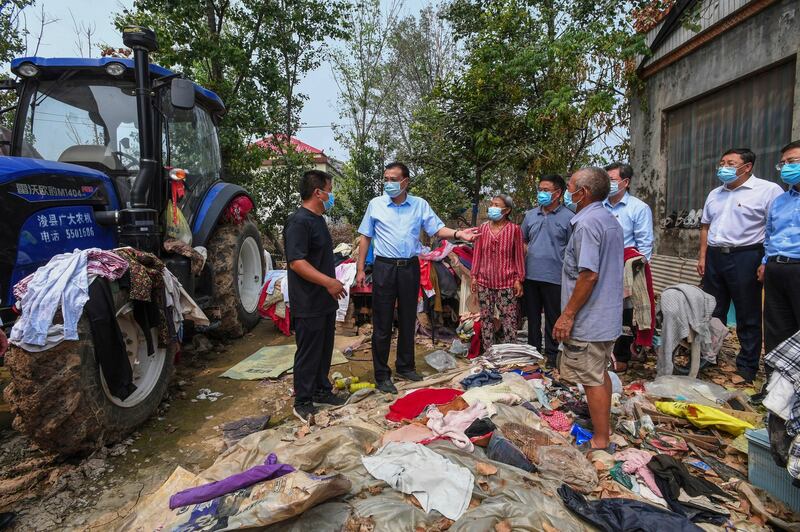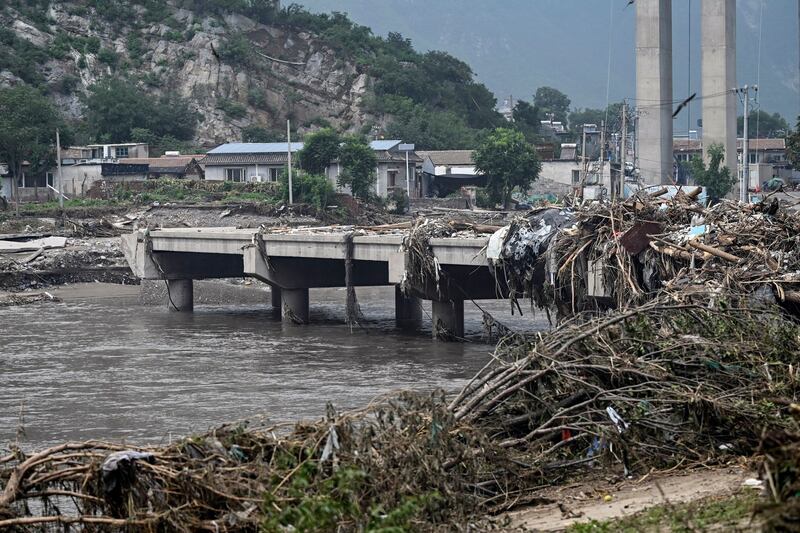After an absence of nearly three weeks, China’s state media reported that President Xi Jinping was back in the saddle, presiding over a meeting on flood prevention and relief as well as post-disaster restoration and reconstruction.
Xi will also attend the 15th BRICS Summit to be held in Johannesburg, South Africa from August 21 to 24, according to a Friday report by Xinhua News Agency.
While in South Africa, President Xi will co-chair with the country’s president Cyril Ramaphosa the China-Africa Leaders’ Dialogue, Foreign Ministry spokesperson Hua Chunying added.
At Thursday’s Standing Committee meeting of the Communist Party of China Central Committee’s Political Bureau, discussions centered on emergency rescue and aid for flood victims and efforts to find the missing, aiming to reduce casualties, Xinhua reported.
But for many of those affected, Political Bureau declarations of resolve in the face of adversity are unlikely to come as any consolation.
Xi's absence during the past three weeks – for the duration of the recent disastrous flooding in northern China – has not gone unnoticed by ordinary Chinese citizens.
Xi had been last seen in public on July 31, just three days after Typhoon Doksuri struck, when Chinese netizens expressed anger at the Hebei Province Communist Party boss, who called on the province to serve as a "moat" to protect Beijing.
In a veiled criticism of Xi, netizens played cat and mouse with censors, sharing video of former Chinese leaders, including Jiang Zemin and Hu Jintao visiting natural disaster zones. One particularly popular clip showed Hu assisting soldiers in disaster relief and Premier Li Keqiang wading through the flooded fields of Chongqing.

Thursday’s meeting called for disaster relief funds to be used efficiently to repair damaged infrastructure such as transport, communications and electricity, while also seeking to restore farmland and agricultural facilities.
But disaster relief has been a prominent target of public criticism. As former Tiananmen student leader-turned-China politics watcher Wang Dan wrote for RFA Mandarin earlier this month, many affected citizens suspect much of the flooding was caused by water mismanagement – venting dams and dikes of floodwater in order to protect Beijing and nearby Chinese Communist Party vanity infrastructure projects.
“Apart from … protests, the Beijing Red Cross Society’s call for donations to aid disaster relief was met with an overwhelmingly negative response and mockery online, another way the public's dissatisfaction was expressed,” wrote Wang.
Missing relief funds
Rumors supported by provincial level audits and even reports in China's state media about how relief funds for previous natural disasters were siphoned off or "misallocated" have "have sparked anger in China and prompted fears that the same thing may happen again" after the recent floods, the South China Morning Post reported earlier this month.
An audit report by the Henan provincial government last month on the handling of some CNY10 billion (U.S.$1.4 billion) in reconstruction funds for the devastating summer flooding of 2021, in which nearly 400 people died, revealed that at least some of the funding earmarked for victims had gone into the pockets of local officials.
The issue quickly went viral online in the aftermath of the most recent flooding due to a commentary on the Henan issue published by the state-run Guangming Daily.

U.S.-based economist Li Hengqing told RFA Mandarin that the distribution of post-disaster compensation funds in China lacks transparency and oversight and local officials often engage in deceptive practices.
“In reality, they report giving you 500 yuan, but what you actually receive is 200 or 300 yuan. They’ve pocketed the rest or shared it among themselves,” Li said.
Zhao Lanjian, a former Chinese media professional in exile in the U.S., told RFA Mandarin that the problem was not only that money was not reaching those that need it, but that even the rallying theatrics of disaster response were now being shelved.
“For the past 70 years, every major disaster has been accompanied by [a] … head of state visiting the disaster area in person for an on-site inspection, putting on a show. But now, even the show itself is forsaken,” Zhao said.
Management
On Friday, the Chinese-language party mouthpiece, the People’s Daily, called for “sparing no effort in emergency rescue” of people who are trapped or missing, while also calling for rescue teams, including from the army and police, to be dispatched well in time.
However, as many have noted, in the most severely affected areas such as Beijing’s Mentougou and Zhuozhou in Hebei Province, the People’s Liberation Army has yet to make any appearances or assist with disaster relief.
Li Hengqing said that they hadn’t done so because officials were waiting for instructions from Xi.
“Why hasn't the PLA [People's Liberation Army] acted?” asked Li. “It’s because Xi hasn’t spoken, so no one dares to act … the decision-making power, action power, and command power all rest with him.”
Meanwhile, in an ironic word-of-mouth story that is not bolstering Xi’s beleaguered public image, Zhuozhou in Hebei Province – a city that was hit extremely hard by days of flooding caused by Typhoon Doksuri – is an important warehousing center for China’s publishing sector.
Countless books were irreparably damaged, reported the China Daily, when floods surged into a publishing logistics park in Zhuozhou that warehouses books for nearly 100 Chinese book companies.
Among the untold numbers of lost tomes is thought to be Xi Jinping’s latest – on studying and implementing the important discourses on the management of water resources.
It was compiled by the Ministry of Water Resources and published by the People's Publishing House in mid-July.
Edited by Mike Firn and Taejun Kang.
